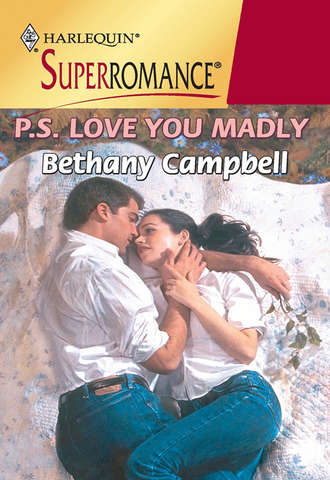
Полная версия
P.s. Love You Madly
“Malay fever,” Olivia said. “There’s no cure for it but rest. He was supposed to be convalescing. Oh, John will be so upset. Do make sure Sloan’s as comfortable as possible. Please. He’s our guest—in a way.”
“Me? Make him comfortable?” Darcy was obviously appalled. “He’s not our guest. He wasn’t invited. He just—just descended on us. Now I know he wasn’t himself, so it may not be completely his fault, but—”
“No buts about it,” Olivia said. “He’s the son of my very dear friend. There is absolutely no sense in you younger people having this Montague-Capulet mentality about our relationship.”
“Mother,” Darcy said with suspicion in her voice, “if you’re comparing John English and yourself to Romeo and Juliet—”
“True love can happen quite fast,” Olivia said with authority. “I used to think it was a myth. It’s not. You may find out yourself someday.”
“I might point out that Romeo and Juliet were kids and got in a lot of trouble by rushing into things. Utter disaster, in fact.”
“Only because their families wouldn’t act civilized,” Olivia retorted.
“Wait, wait, wait,” Darcy begged. “You’re turning everything around.”
“I’m in love with John,” Olivia said. “I hope to remain in love with him for the rest of my life. And I hope all of our children can learn to coexist like mature adults.”
“And I’m sure we all hope that our parents will act like mature adults,” Darcy said with unpleasant sharpness.
“A member of John’s family is ill in Austin,” Olivia said loftily. “My family lives in Austin. A member can look in on him and see to his well being. It is, Darcy, nothing more than simple courtesy.”
“Mother, it’s anything but simple.”
“It’s plain old-fashioned good manners,” Olivia returned. “And it is not, I think, too much to ask. Goodbye now, darling. I need to call John immediately. Love to you and Emerald, too.”
“Mother—”
“Kisses for you both,” she said, and hung up.
Olivia stared out at the ocean, the white surf breaking on the rocky coast. She rebuked herself for her cowardice. But she had meant to reveal things to the girls at her own pace, little by little. Darcy was strong, but Emerald was a different matter. Olivia feared springing things on Emerald.
So Olivia had said nothing about the brand-new engagement ring on her left hand. And she did not yet intend to.
She picked up the phone and dialed John’s number. “Oh, sweetheart,” she said apologetically. “I hate to call you at work. But this really is an emergency…”
SLOAN FELT LIKE A JACKASS.
He’d been wheeled into the emergency room with as much melodrama as if he’d been spurting blood from a dozen gunshot wounds. He’d been poked, prodded, squeezed, palpated, stripped, sponged and medicated.
Now he was trapped in a hospital room with a small, withered nun with cold hands. She had a thermometer in his mouth and was feeling the glands in his throat with her icy fingers. Her touch gave him an attack of the chills so severe that he feared he would bite the thermometer in two and die of mercury poisoning.
The phone beside his bed rang, but when he reached for it, she slapped his hand back. She picked up the receiver herself. “This is Mr. English’s room,” she said in a voice so brisk it crackled. “Sister Mary Frances Foley speaking. Mr. English can’t talk right now.”
“Yes, I can,” said Sloan around the thermometer.
The little woman glared at him. “No, you can’t,” she snapped. She addressed the caller again. “May I take a message?”
She listened, then covered the receiver and stared at him through her wire-framed bifocals. She had pale eyes that seemed to look directly into his brain and see all the sins he had ever committed and all that he would commit. “It’s a woman,” she said disapprovingly. “A Darcy Parker.”
Sloan felt his face flush, his shudder of cold replaced by a surge of heat. He didn’t know if it was due to his fever or to the mention of the Parker woman. If the woman caused it, he didn’t know exactly why.
Was it shame over how foolishly he had gone to her door, his judgment warped by fever? He supposed it was. Yet the memory of her dark eyes and slender curves stirred a warmth in him that he suspected had nothing to do with Kuala Lumpur and its mosquitoes.
“Miss Parker has a question, but—” The nun paused dramatically, then held up her hand like a traffic cop. “I do not want you to speak. I will give you a notebook. On it, you will write down your answer. Answer clearly, write neatly, and don’t ramble.”
Sloan gave her a stare that told her he was not pleased with her high-handedness. She gave him one that told him she did not care.
She withdrew a notebook from the folds of her black gown and set it down smartly on his bedside tray. It had a black pencil attached.
She said, “Miss Parker says your car is at her house. You left it open with the keys in it. She wants to know if you need anything from it. Or if you want the car taken somewhere.”
Sloan scowled and wrote There’s an overnight bag in the trunk. Tell her to put it in a cab. I’ll pay for it. I’ll send someone for the car later.
He paused and thought again of raven hair and a quirking, voluptuous mouth. He gripped the pen more tightly and added Thank her for her kindness.
The nun related his message, then listened again. “No, he’s doing well,” she said. “He’s having his temperature taken, that’s all. And he needs his rest. Goodbye.”
She hung up, glanced at her watch and took the thermometer from his mouth. She gazed upon it without emotion. “You’ve gone down a degree.”
“What did she say?” Sloan demanded. “Miss Parker.”
The nun marked his chart with painstaking care. “She said that she’ll bring your bag herself.”
“She doesn’t have to do that. I told her to send it by cab.”
“I wouldn’t object to a kindness,” the sister said primly. “There’s little enough of it in the world.”
“I mean, she doesn’t have to go to the trouble.” He hesitated, then tried to sound nonchalant. “She, uh, asked how I was?”
“I thought that was obvious from my end of the conversation.” Neatly she shut the notebook, restored it to the folds of her black garment, and turned away. She left the room so silently that it was as if she weren’t walking, but levitating just above the surface of the floor.
He looked after her, half wondering if she had been a hallucination. Why did half the women he’d talked to today seem as if they’d come from fever dreams?
There had been Velda with her jalapeño gumdrops, the girl dressed in chain mail, and the large woman who’d been built like a World Federation wrestler and who had brandished a golf club at him. It was tempting to dismiss them as creatures of a delirium.
On the other hand, there was Darcy Parker, just as unexpected and not at all easy to dismiss. He thought, I was lying in her lap. Her arms were around me. I was foolish and weak, but she tried to give me comfort. Her breast touched my cheek…
“Oh, hell,” he muttered, trying to thrust away the image.
He was a man used to being in control. She’d seen him when he wasn’t. He didn’t relish her seeing him again in circumstances just as pathetic—stuck in a hospital bed wearing a stupid hospital gown, having nuns and nurses descend upon him.
He opened the drawer of his bedside table, fumbled in his wallet for her card and found it. He would call her, tell her not to come. He reached toward the receiver. He would wait to see her until he was his old self, back to normal and once again in charge of his destiny.
But before he could touch the phone, it rang. He frowned and picked it up. “Hello?”
“This is your father,” said John English’s voice. “I don’t know what to ask first. How the hell are you? Or what the hell are you doing in Austin?”
Sloan gritted his teeth and fell back hard against the pillow. “Hello, Dad,” he said with resignation.
The last time they’d talked, his father had hung up on him. That, in a way, had triggered the entire circus of fever and folly in which he now found himself.
“I talked to the doctor who admitted you,” John English said gruffly. “He said that damn fever’s recurred. That you’ll be fine—if you’ll rest.”
“Yeah, yeah,” Sloan said. He glanced around the barren hospital room. It looked as amusing as the inside of an empty eggshell. “I’m resting right now. I’ll be fine.”
“You were supposed to be resting in Tulsa—what happened?” John demanded. “This is how you got so sick in the first place. You wouldn’t slow down. Oh, no. Not you, the iron man.”
Sloan shrugged irritably. “It crept up on me. I didn’t realize it, that’s all. It’s no big deal.”
“You’re in the hospital, but it’s no big deal. I see.”
“I lost consciousness for a few seconds,” Sloan said, sneering at the absurdity of it. “They put you in the hospital for that these days—for observation. People overreact.”
“You weren’t supposed to be running all over creation,” John accused. “You were supposed to be recuperating.”
“I felt fine. I felt great.” It was the truth. He’d jogged the day before—five miles, like the old days. His body had sung like a finely tuned string. He’d felt like himself again.
But then he’d gone back to his apartment, and his aunt had called, and she, who for years had manipulated his emotions, had wept and begged.
Now he put his hand to his forehead, which was still hot. Remembering Trina made his temples throb again. He squeezed his eyes shut against this energetic new onslaught of pain.
“So you took off for Austin,” John said suspiciously. “And you went to see—to confront—the daughter of the woman I love. May I ask why?”
It seemed like a good idea at the time, Sloan thought, his head aching harder. “I was passing through,” he lied. “I thought it might be good to meet.”
“Ha,” snorted John. “Why? Because Trina’s ‘worried’? She put you up to this, didn’t she? Her and her goddamn emotional blackmail.”
Sloan massaged his eyebrows. The old man was plenty sharp in his way. Yes, Sloan had come to Austin half to placate Trina, half to appease his own demons. Trina had helped create those demons, and for years she had nurtured them.
He’d been a fool to come here. But she’d pleaded, and her pleading worked partly because he owed her. So, for that matter, did his father. Promises had been made. An honorable man kept them.
“Olivia’s a wonderful person,” John said. “Trina’s jealous, it’s that simple.”
“Dad,” he said wearily, “why’d you even tell her about this woman?”
“Because it’s the truth,” John shot back. “Hell’s bells. I get sick of pussyfooting around with Trina. She’s fifty-eight years old. Every time something doesn’t go her way, she pulls her martyr act. Think about it, boy.”
I can’t. A mosquito just pinned me, two falls out of three. Sloan touched his aching head. Lord, he was too tired to think anything, let alone of the complexities that Trina had created in his life—and in everyone else’s. Someday when he was old and gray, he would hobble off to a hermitage and meditate until he figured it out. In the meantime, he simply wanted his head to stop thudding.
“Trina asked me straight out if I was seeing a woman,” John said defensively. “I don’t know how she knows these things. Maybe she has flying monkeys that report to her, I don’t know. But I thought, Why should I lie? I told her the truth. She kept asking. I kept telling. Until she said, ‘God have mercy on your deluded soul’ and hung up on me. Me—her own brother. Her own flesh and blood.”
“Um,” Sloan said, massaging his brows again. “So when I called, you hung up on me. Your own flesh and blood. Why? Payback time?”
“Hell, you said you’d just talked to her. I knew she put you up to it. I refuse to play her games anymore. If you were smart, you wouldn’t let her catch you up in these things.”
Sloan grimaced. His father was right; he shouldn’t have let Trina pull his strings. If he’d been well, it never would have happened. Yet, for all her carrying on, Trina had a point. John should not plunge into another marriage. He had bad luck picking women.
His father’s tone changed to one of concern. “I told you we’d talk when everybody was calmer. That time is probably not now. You sound worn out. I’ll call again—later.”
“Dad,” he said, “my main concern is that you and Trina have an understanding about certain things. For instance, there’s—”
“Later, son,” John said with surprising gentleness. “Don’t worry about Trina. Take care of yourself.”
“Dad—”
“Goodbye for now. Get some rest.”
The line hummed meaninglessly in his ear. He opened his eyes long enough to hang up the receiver, then sank back against the pillow.
Oh, hell, he thought bleakly. That’s another bloody thing. I need to call Trina—or she’ll worry.
But for a moment he needed to lie there, his eyes shut against the erratic ebb and flow of the pain in his skull. He told himself he would choose his words carefully for Trina, rehearse them to perfection.
But he did not. Exhaustion covered him like a dark blanket. He slept.
DARCY GOT OUT of the hospital elevator lugging Sloan’s leather overnighter in one hand. In the other she carried a bunch of wildflowers, a gesture she now supposed was ridiculous.
She’d made a card with a foolish cartoon face on it and had tied it with a ribbon to the clay vase. She’d pondered fretfully over the message and finally settled on the highly unoriginal but dependable Wishing You a Speedy Recovery.
She had brushed her hair and let it hang loose. She had changed her T-shirt for a white silk shirt and a vest she’d made of interesting silk scraps. But otherwise, she hadn’t dressed up. Whether he found her attractive was of no concern to her, she told herself. None at all.
Yet she was nervous as she approached his room. It was an odd, silly kind of nervousness that she connected with very young girls who have just discovered the opposite sex. She hadn’t felt it in years, and it unsettled her to feel it now.
Maybe he won’t be in his room, she thought with edgy hope. Maybe they’ll have him off somewhere immunizing his blood or x-raying his head.
His room was number 1437, and its door was open only a few inches. She raised the hand with the flowers to give the door frame a hesitant knock, but the door itself opened. She found herself staring into the eyes of a tiny, wizened little nun.
“Oh,” she breathed, startled.
The nun looked her up and down without emotion.
“Mr. English,” Darcy said in a hospital whisper. “I’ve brought his overnight case and some—” she gestured self-consciously “—flowers. Is it all right to go in?”
“He’s sleeping,” said the nun. “He shouldn’t be disturbed.”
“Oh,” Darcy repeated. She felt both relief and a strange disappointment. Behind the little nun, she could see the hospital room, and it looked so bland and joyless that she was glad she’d brought the flowers.
In the bed, she saw Sloan English’s long form stretched out beneath a sheet and thin blanket. His face was turned away from her. His brown hair seemed dark against the stark whiteness of the pillowcase.
“I’ll take these things,” the little nun said firmly. She commandeered the flowers and tried to take possession of the suitcase.
“No, no,” protested Darcy, “it’s too heavy. Let me.”
For a moment, the nun’s cold fingers rested next to hers on the case’s handle. She studied Darcy’s face as if it were a book with large print, and she could read everything in it with no difficulty whatsoever.
“As you wish,” she said without emotion. Silently she turned and placed the vase of flowers on the bedside tray. She nodded at the bureau, and her meaning was clear: Put the case down there. Quietly.
Darcy obeyed. Carefully she set down the overnight bag so it would make no noise. Then she turned to leave.
On the bed, Sloan stirred, and his head turned. She could see his face, and although illness had whittled it too lean, there was still beauty in the strong, fine bones of it. The cheekbones were high and sharp, the jawline strong, the chin stubborn and marked by a deep cleft. His nose had an aquiline curve that reminded her of a Roman prince.
The face was almost in repose, but even in sleep the dark brows drew together as if trying to frown. His lashes were thick and black, like blades of jet.
Her heart seemed to spin out of her body, as if it were trying to hurl itself into some higher, more intense world. She took in a sharp but soundless breath. She lost herself in staring at him.
She was an artist, and she knew comeliness when she saw it, but she saw more than just handsomeness in his sleeping face. There was a solitariness about this man that was both touching and disturbing.
Then the nun motioned toward the door, and Darcy understood. She should go. She stole one last glance at Sloan, then ducked her head and left, feeling guilty.
The nun followed, easing the door shut behind them. She looked up at Darcy.
Darcy’s heart had come home to her, but it felt changed. “Will he—will he be all right?” she asked.
“If we can tie him down and make him rest,” said the woman.
“I never heard of Malay fever before,” said Darcy. “Is it bad?”
“He obviously had a bad case. It could have killed him,” said the little nun, looking her up and down again. “This relapse should be a lesson to him. Make sure he pays attention. He needs to learn to stop and smell the flowers. I’d take good care of him, if I were you.”
Darcy gave a small, embarrassed laugh. “He’s not mine.”
The woman gave her a look that told her not to argue.
“You brought the flowers, didn’t you? Maybe you’re supposed to teach the lesson, too.”
She turned and glided off, leaving Darcy standing alone.
The faintest scent of wildflowers still hovered in the antiseptic air.
CHAPTER FOUR
SLOAN AWOKE to a fragile, foreign perfume that he couldn’t identify. It was so delicate that he at first thought he was having some sort of rare hallucination of the nose.
It would go away, he thought; all he had to do was open his eyes.
A hard job, but he was the man for it.
Yet when he forced his heavy lids to raise, the scent did not fade, and his vision was filled by an unexpected kaleidoscope of color.
Flowers. He frowned. Someone had brought him flowers. But not from a florist. This was no formal and formulaic bouquet, its design picked from a catalog and its flowers arranged by rote.
No, the flowers were a wild profusion of untamed color—brilliant scarlets, vivid yellows, and blues as profoundly deep as the spring sky.
They spilled out of a strange clay vase painted with a bright design that wasn’t quite like anything he’d ever seen. It was not elaborate—just the opposite. But it was the perfect complement for its rich cache of blossoms.
A rainbow-striped ribbon had been tied around the vase. From the ribbon hung a card with a charming cartoon face. He groaned, raising himself on one elbow. Merrily colored letters spelled out Wishing You a Speedy Recovery. It was signed with the initials D.P.
The card was made by hand, but the hand had an expert and impish touch. D.P.—Darcy Parker. He thought of the tall woman with the offbeat beauty and the tousled dark hair.
He looked at the bureau. His overnighter rested there. She’d been in his room. She’d left this unlikely bouquet as if it were some sort of souvenir of a Midsummer Night’s Fever Dream.
He fell back to the pillow, squeezing his eyes shut against the blaze of color. He’d have to thank her. He’d have to apologize to her. How? He didn’t want to think about it, and he was momentarily saved from the task—his telephone rang.
He groaned and hoisted himself back up. His head still ached, and his joints still throbbed, but neither pain was as epic as before.
He lifted the receiver. “Hello?”
“Hello, you stupid horse’s neck,” said a familiar male voice. “Who in hell told you to drive clear to Austin?”
Sloan sank back against the pillows with a harsh sigh. The voice, which had a permanently mocking edge, belonged to Tom Caspian. Tom, a former fraternity brother, was now his doctor in Tulsa.
“I felt fine,” Sloan said. “For the first three hundred miles.”
“Dammit, there shouldn’t have been a first three hundred miles,” Tom chided. “I told you to take it easy for at least another six weeks. Malay fever’s tricky. You take care of yourself, or the angels’ll be scattering posies on your grave.”
One already has, Sloan thought, opening an eye and regarding the bouquet of wildflowers.
“Where’d you get the bright idea of a trip?” Tom persisted. “I told you to stay put.”
“I was tired of staying put,” Sloan grumbled.
“Follow doctor’s orders, buddy. Or you’ll be staying put under a tombstone.”
“I’m sick of hearing about it,” Sloan said with distaste. And he was. He’d convalesced two endless months in Southeast Asia. When they’d finally let him come back to the States, he’d been given the impossible command to rest and mend for another three. He was a man built for action, not relaxing. Physical idleness was hellish.
“You been running?” Tom asked, his tone accusatory. “I told you to take it easy on the running. Jog a mile a day, at most. Have you been holding it down to that?”
Sloan thought of the five miles he had done the day before. His body had felt whole again, a strong, efficient machine, all pistons pumping and powerful as ever. “I did a little more,” he admitted.
“Hell, Sloan,” Tom said in disgust. “Have you got a death wish?”
“No. A life wish,” retorted Sloan. “I used to have a life, and I want it back, dammit.”
“It won’t happen overnight, Superman. Lord, Sloan, you’ve always pushed yourself harder than anybody I know. That’s not how you beat this fever. You’ve got to respect it. The Angel of Death passed you over once, buddy. Don’t give him the chance to make a U-turn.”
Sloan put his hand to his forehead, which was hot and sweaty and had started to bang again. “All right, all right,” he said impatiently. “How’d you find me, anyway? Did you implant a microchip in my ass last time you gave me a shot?”
“I ought to, you knothead. No. The hospital down there tracked you through your insurance card. I’ve talked to the admitting physician. He’s referred your case to a specialist in tropical diseases from the university.”
“I don’t want a specialist in tropical diseases from the university. I’ll stick with you. You play bad tennis and have good scotch. What more could a man want?”
“Listen, pal, you’ve already got a specialist. The name is Dr. Nightwine, and we’ve talked. You’ll get a visit by late this afternoon.”
“I want to be out of here this afternoon.”
“No way. You’re under observation.”
“Observation, hell. Come on, Tommy. Make them release me. I’ll come straight home. I’ll get in bed and pull the covers up to my chin. I’ll watch soap operas all day and take up knitting. Just get me out, will you?”
“You don’t travel until Nightwine says you can.”
Sloan swore, but Tommy was adamant. “Nightwine’ll keep you around a couple of days at most, it’s for the best. Another thing—I know you don’t want to hear this, but I’ve put off saying it long enough. I don’t think you should keep taking these extreme assignments. You get in these dangerous environments and—”
“It’s what I do,” Sloan said, cutting him off. “Changing is not an option. Don’t even mention it.”
There was a moment of awkward silence. Tom cleared his throat. “If you don’t mind my asking—exactly what made you take off for Austin like a bat out of hell?” He laughed. “A woman?”
Sloan looked at the vivid wildflowers in their odd yet perfect vase. A woman, he thought. He said only, “Family matters. That’s all.”
He said goodbye; he hung up. But in his mind hovered the image of Darcy Parker, her pert face and her cloud of dark hair.








